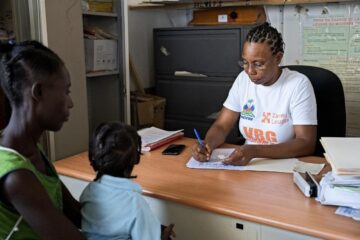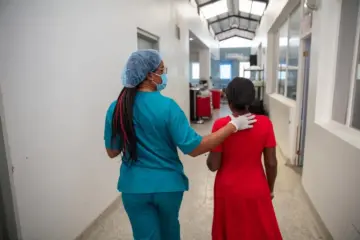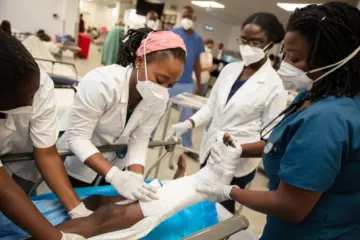Taking the High Road to Treat Child Malnutrition
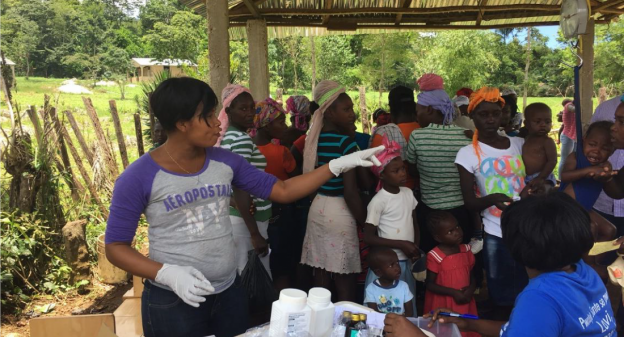
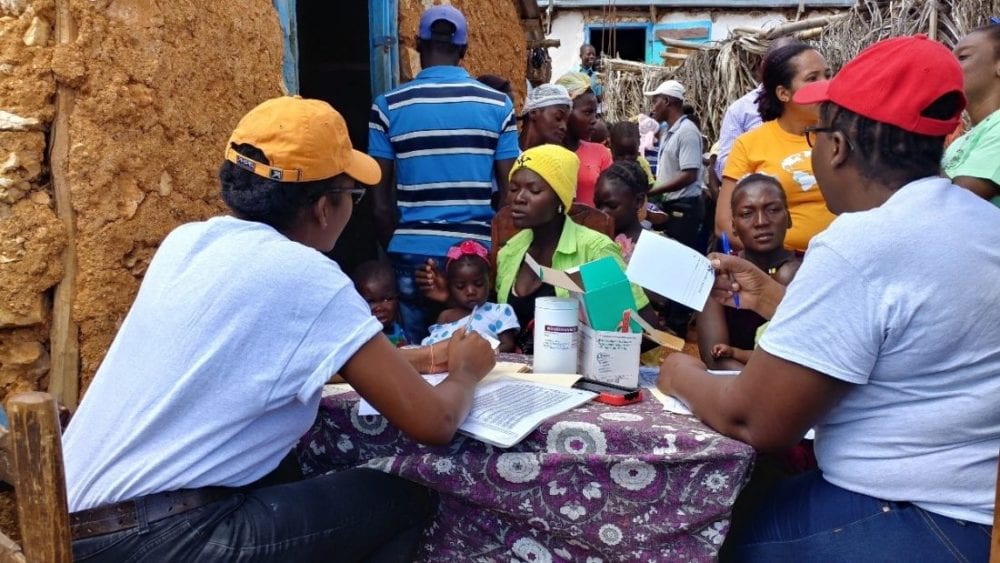
PIH Canada National Director Mark Brender and Senior Manager Emily Antze recently visited Haiti for a first-hand look at PIH’s efforts to prevent and treat child malnutrition. As Mark writes, it can be a bumpy ride but is well worth the effort.
HAITI – Travelling with colleagues on a rock-jutting, axle-punishing road high into the hills above the coastal city of Saint-Marc, the thought occurs that a mobile clinic is only a mobile clinic if the tires don’t get punctured on the way up the mountain.
Our three-vehicle convoy includes two nurses, two auxiliary nurses, two Canadian visitors, a community health worker (CHW), a malnutrition program supervisor, medications, scales, medical records and charts, and 200kg of Nourimanba, the locally produced peanut-based, high-calorie food that saves lives. There is no electricity where we’re headed. There is no health center. If someone has to walk from the community of Coquillo to the hospital in Saint-Marc, they set out at 4am to ensure they’ll be seen in time to get back home before nightfall. Which is why, when we eventually arrive, tires intact, at a remote primary school that on this day also serves as a health post for the treatment of child malnutrition, there is a sea of mothers, grandmothers, infants and young children waiting for us.
One of Partners In Health’s goals wherever we work is to eliminate all deaths due to malnutrition in children under five years of age. Malnutrition in Haiti contributes to an estimated 30% of all child deaths in the country. Stunting affects roughly one-quarter of all children, with a greater burden in rural areas. Dr. Martine André, head of pediatrics at PIH-supported Hopital Saint-Nicholas (HSN) in Saint-Marc, saw a child not long ago who lost both eyes due to malnutrition-related illness.
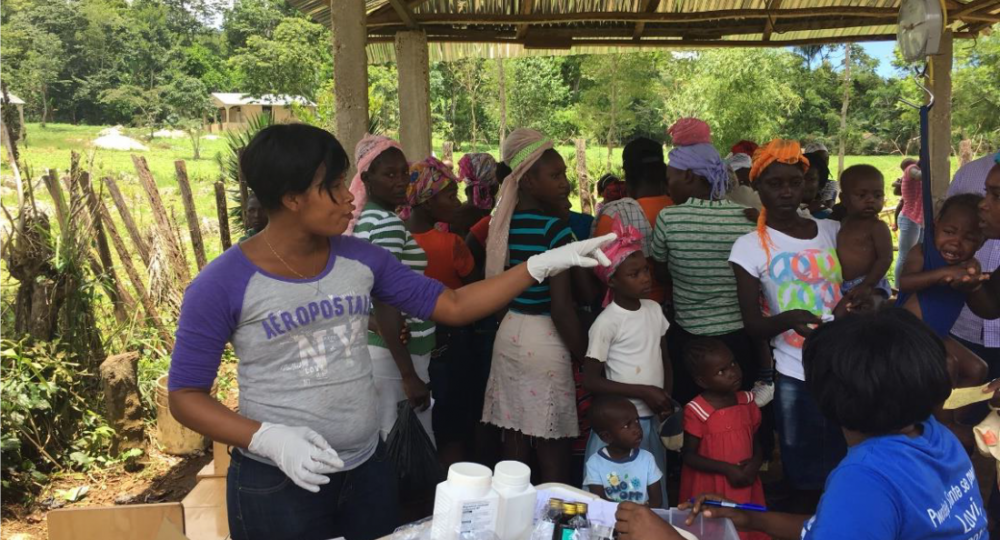
And yet, we know the solutions: Provide children with adequate calories for growth and development, through food that won’t spoil over several weeks and doesn’t need to be refrigerated. Bring malnutrition screening and care closer to communities to increase frequency of treatment and prevent moderate cases from becoming severe. Build systems for patient tracking and follow-up including regular home visits from CHWs to improve linkages between the community and health facilities.
This is what funding from generous PIH Canada donors and game-changing support from Canadian Foodgrains Bank / Presbyterian World Service and Development is making possible in the Saint-Marc catchment area. The mobile clinics started in January. It hasn’t taken long to see the benefits. “Since they started mobile clinics, the number of hospitalizations (for children with severe malnutrition) has decreased dramatically,” Dr. André says. “I think it’s the best thing we could ever do.”
There are close to 100 infants and children waiting at the school. Most of the children are already enrolled in the malnutrition program from previous mobile clinics and outreach from CHWs. A handful are new today and will get enrolled for the first time. (All children newly enrolled will also get tested for HIV). While the nursing staff are setting up, a community health worker gives a presentation on the kinds of nutrients children need and links between food and clean water and hygiene. If parents don’t have access to clean water, children with diarrhea won’t be able to gain weight – so household water and sanitation measures are also integrated into the program.
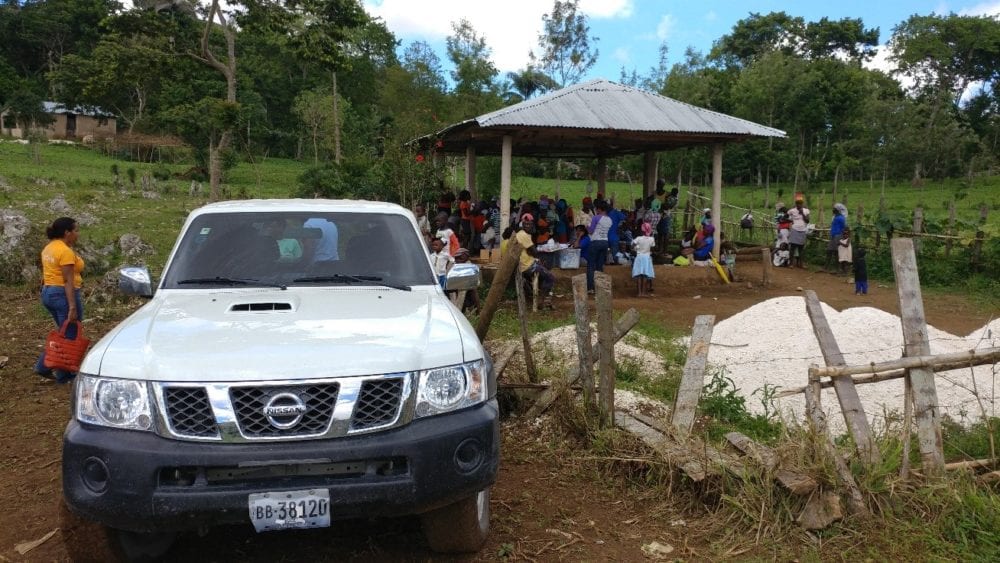
After the presentation, caregivers and their children line up to be seen. Auxiliary nurses measure each child’s height and weight and upper arm circumference and compare results with charts from previous visits. In addition to a two-week supply of Nourimanba, some children also receive iron supplements, oral rehydration salts, deworming antibiotics or cream treatment for scabies. It’s one of the benefits of the mobile clinics: While children are enrolled to improve their nutrition, they’re also accessing broader medical services.
Another mobile clinic, also supported by PIH Canada but at even more remote location, is happening at the same time an hour’s drive away, in a place called Dubec. (Some of the families at this site have a two-hour walk just to get to the clinic location, to say nothing of their walk to receive non-mobile health services). The next day there will be other mobile clinic sites visited, and more the day after that. The team will be back in these communities in two weeks’ time to do it all over again.
Between January and March of 2018, the team ran 108 mobile clinics in rural, remote, hard-to-reach places over a three-month span. Each mobile clinic holds dozens and dozens of daily success stories: infants and children who live hours from a doctor or a road or electricity, and who are receiving health care and nutritional support that will give them a chance at a future not impeded by stunting or wasting or developmental delays. It’s life-affirming work, and it’s why our Haitian colleagues would love to roll out more mobile clinics to so many other communities in other districts beyond Saint-Marc. Where there’s a wheel, there’s a way.
Learn how PIH is tackling malnutrition and helping children thrive across each of our sites.
